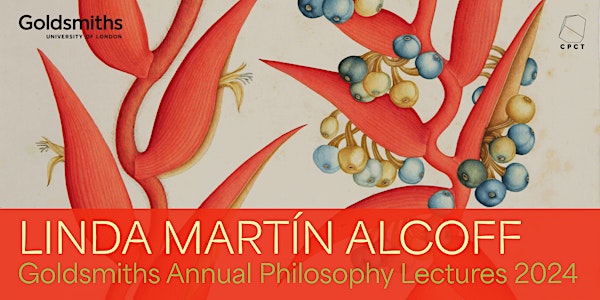
Goldsmiths Annual Philosophy Lectures 2024: Linda Martín Alcoff (CUNY)
With responses from Sumi Madhok (LSE) and Oscar Guardiola-Rivera (Birkbeck)
Location
University College London
Gower Street London WC1E 6BT United KingdomAgenda
4:00 PM - 4:10 PM
Welcome and Introduction
Dr. Julia Ng (Goldsmiths)
4:10 PM - 5:20 PM
Lecture 1: Extractivism as a model for Modern Epistemology
Professor Linda Martín Alcoff (CUNY)
5:30 PM - 6:00 PM
Response
Professor Sumi Madhok (LSE)
6:00 PM - 7:00 PM
General discussion and Q&A
About this event
- 3 hours
The Centre for Philosophy and Critical Thought at Goldsmiths, University of London cordially invites you to the 5th Goldsmiths Annual Philosophy Lectures 2024
Professor Linda Martín Alcoff (Hunter College, CUNY)
Lecture 1: "Extractivism as a Model for Modern Epistemology"
Respondent: Professor Sumi Madhok (LSE)
Tuesday, 7 May 2024
4-7pm
Sir Ambrose Fleming Lecture Theatre G06, Roberts Building, UCL
(https://www.accessable.co.uk/venues/roberts-building-sir-ambrose-fleming-lecture-theatre-g06)
Extractivist epistemologies work analogously to extractivist capitalism by extracting something of value, transferring it to another location, and then making use of its value. Sometimes, the item being extracted is knowledge, or an object that is thought to contain knowledge. Thus, in this case extractivists seek an epistemic resource of some sort---such as a piece of pharmacological knowledge held by an indigenous community or a rural healer concerning the medicinal potential of a given plant, or an artifact from an indigenous funeral site that can help them understand the nature of that particular culture. I argue that extractivist epistemologies developed in the modern era in a way that was marked by this practice and its implicit assumptions about how value (epistemic or otherwise) can be identified, can be made portable, and can be made use of. The extractivist epistemic approach treats this epistemic resource as separable from its origin, and then renders it into a knowledge commodity with exchange value over which exclusive rights can be contractually defined, protected and enforced. But to do this involves a whole series of metaphysical and epistemological assumptions about the nature of knowing as well as the norms of good knowing. This paper will also offer corrective epistemic norms to address the problems I have identified in extractivist epistemologies.
Lecture 2: "Imperial Museums"
Respondent: Professor Oscar Guardiola-Rivera (Birkbeck)
Wednesday, 8 May 2024
3-6pm
A V Hill Lecture Theatre, Medical Sciences, UCL
(https://www.accessable.co.uk/ucl/access-guides/medical-sciences-a-v-hill-lecture-theatre-131)
My focus here will be primarily on archaeological museums that house cultural artifacts from many cultures: these are what I call "imperial museums". I will focus on the knowledge claims made by such museums, which are used to justify their retention of their collections. The primary way museums legitimate their right of ownership and of display is on the basis of protecting a universal cultural knowledge which has unlimited reach into the future. I will explore and analyze the debates over this claim, looking especially at the issue of human remains of indigenous peoples in the Americas and the effort to repatriate these remains. I will also look at some current options for transforming such museums as developed by Dan Hicks, Ariella Azoulay and Philip Deloria. The principal issue this paper is concerned with is not the right to retain objects but the ideological effect of such museums in the legitimation of Imperialism, both past and present.
About the speakers
Linda Martín Alcoff is professor of philosophy at Hunter College and the Graduate Center, CUNY, and Co-Director of the Mellon Public Humanities and Social Justice Program. Her work bridges political and philosophical topics, on epistemology, Latin American philosophy, feminism, critical race theory and continental philosophy. As well as writing numerous academic and public facing pieces in philosophy, her books include Rape and Resistance (Polity 2018), The Future of Whiteness (Polity 2015), and Visible Identities: Race, Gender and the Self (Oxford 2006), which won the Frantz Fanon Award. She has also edited eleven books and published over 100 articles and book chapters. She is past president of the American Philosophical Association, and is originally from Panama.
Sumi Madhok is Professor of Political Theory and Gender Studies and Head of the Department of Gender Studies at LSE. Her work combines critical theory and ethnographic approaches with a focus on South Asia and is interested in social sciences focused on epistemic interventions from the Global South. Her latest book is Vernacular Rights Cultures: The Politics of Origins, Human Rights and Gendered Struggle for Justice (Cambridge, 2021), winner of the 2022 Susan Strange book award.
Oscar Guardiola-Rivera is Professor of Human Rights and Political Philosophy at Birkbeck Law School. His work covers decolonial and anti-colonial approaches to philosophy, law, art practice, and education, with a focus on the Americas and Atlanticism, emphasising decolonial and visual methodologies, political economy, and racial justice. His What If Latin America Ruled the World? (Bloomsbury, 2010) won the Frantz Fanon Award.
Co-sponsored by the Department of English, UCL. Free and open to all.
Contact: j.ng [at] gold.ac.uk or s.bromberg [at] gold.ac.uk
Web: cpct.uk
Frequently asked questions
Yes, but please register to help us manage numbers.